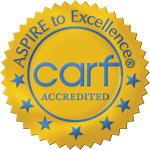No one wants to be addicted to drugs or alcohol, and it can be difficult to accept that you might have an addiction. You’ve probably heard that only 10–11 percent of people who need substance use treatment are getting it. There are different reasons for that treatment gap, not all of them personal. But there are many people who don’t get the help they need because they either don’t know if they have an addiction, or they don’t know what to do about it.
For those who haven’t had any experience in the addiction treatment community, the range of providers and services can be daunting. It’s easy to put off getting help if the next step isn’t clear to you. What should you do if you think you might have a substance use problem?
Are there signs you might have an addiction?
One barrier to taking that next step can be having doubts about whether you really have an addiction. When does social drinking become an issue of dependency? Is there a magic number of instances of drug use that make you addicted? The truth is that substance dependency can happen in different ways and on different timelines. In other words, not everyone experiences the onset of addiction in exactly the same way. Consider some of these questions if you’re not convinced that your substance use might equal an addiction.
- Do you feel bad if you can’t use your substance of choice for any extended period of time? Do you feel physically ill if you don’t use it? Do you get depressed, anxious, or moody if you don’t use it?
- Have you ever blacked out or experienced an overdose using drugs or alcohol?
- Has drug use interfered with your work life or family life? For example, have you ever been high while on the job? Have you been penalized or fired for drug use or behavior related to it? Has using been a source of conflict between you and your loved ones?
- Do you have cravings or a strong desire to use every day?
- Have you made poor financial decisions to get drugs? Have you ever stolen money to buy drugs or alcohol? Have you had trouble paying bills because you’ve spent too much money on substance use?
If you can answer yes to any of these questions, it’s likely you have a dependency that could be helped by seeking treatment. But these aren’t the only criteria for addiction. Substance use disorders can vary in their severity. If you’re wondering whether you have an addiction, there are probably some indications that you do struggle with dependency on some level. If it’s on your mind, you could benefit by taking the next step: talking to a professional.
So I might have an addiction, but can’t I fix it on my own?
Here’s another reason why that treatment gap exists. It can be tempting to believe that, however bad your problem is, you can make a change without getting help from professionals. Many people think that if they just have enough self-control or will-power, they can stop abusing drugs or alcohol. There are some problems with that thinking, though.
Heavy substance use produces changes in a person’s brain that makes it difficult to stop using. To get a sense of why that is, you should know that these changes take place in the same brain structures that influence motivation, risk/ reward decision-making, memory and habit, and the ability to feel good. For more on what substance use does to your brain, read up on Why Addiction is a Brain Disease.
There might also be environmental factors that would make it hard to quit on your own. These could include people who also use drugs and who you see regularly. Having access to addictive drugs makes it easy to continue to use. There could also be pressures from work, family, or social life that you have dealt with by using in the past.
Finally, investing everything in your own ability to stop using can be isolating and the cause of depression and further use. If you feel like you’re the only one who can understand your problem and help fix it, you can end up feeling alone and without much hope. Not only is that counterproductive, it’s just not true: you’re not alone. There are countless others experiencing the same problems, and there are many people and resources out there that offer a way forward.
How do I find help that’s right for me? Where do I start?
Not everyone with a substance use problem requires exactly the same kind of treatment. There are different options available, so it can be difficult to know what kind of treatment you should pursue. Would you benefit more from a long-term residential rehab center, or would outpatient treatment work for you? Do you need medication-assisted treatment? These are good questions to have—but you’ll need to get help finding answers! The truth is that talking to a professional can go a long way in figuring out what level and kind of treatment would best fit your needs.
Reaching out to a pro for help could mean asking your regular physician, if you have one. If they don’t have the ability to consult you on treatment options, they can probably refer you to someone who can. You can also consider seeking addiction assessment services from a reputable addiction care provider or specialist. Stepworks and other treatment providers offer this service, often free of charge. The purpose of an assessment is to let an addiction professional hear about your personal history of use so that they can help you find the right level of treatment.
It can be hard to take that first step. You might feel anxious about discussing your problem with another person. It might feel like it’s outside your comfort zone. But if there’s one important thing to take away, it’s this: addiction treatment works! By talking to a professional, you can start figuring out the right course of treatment and place yourself on a path to achieving lifelong sobriety. The goal of seeking help is to start a process of change and personal growth. The goal of treatment is to work on changing the mental and social activities that contribute to your choice to use drugs or alcohol in the face of negative consequences. By reaching out, you can discover a world of tools and resources to use to change your addictive thinking and habits.
If you think you might have an addiction, you can talk with a Stepworks team member today. Use the form below or call us at 1-800-545-9031.
Personal Form
Contact form for those who think that they may have an addiction.




